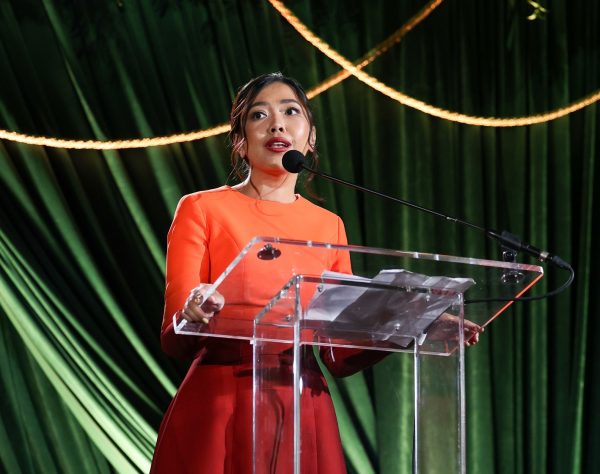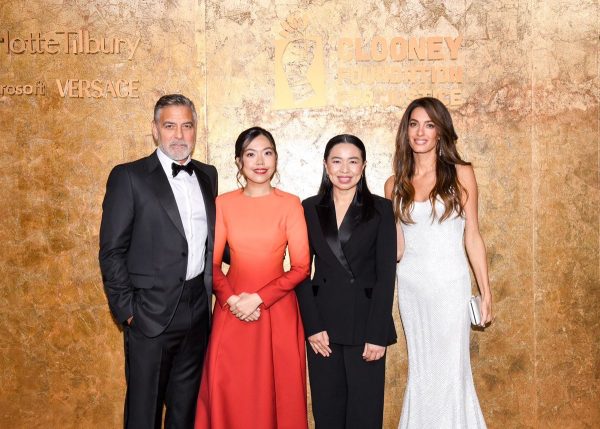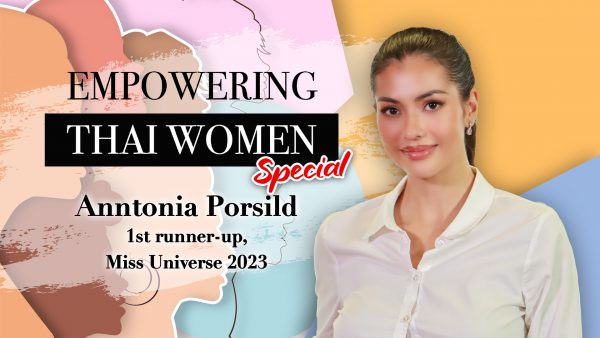Believe in what you believe – Sirikan Charoensiri & Pawinee Chumsri

“We still have a long way to go towards true democracy.
The fight for justice is never easy,
but as the dawn always comes
change for a better future is now in our hands.”
This is part of Sirikan Charoensiri’s speech, after she took to the stage to accept the “Justice for Democracy Defenders” award at the Albie Awards in New York City in September 2023, organised by the Clooney Foundation for Justice, founded by George Clooney and Amal Clooney.
Sirikan and Pawinee Chumsri are two female lawyers at the Thai Lawyers for Human Rights (TLHR), among other activists around the world, who received the prestigious recognition. Described as the Oscars for justice defenders, both Sirikan and Pawinee feel proud of this achievement, as it means the international community has recognised their advocacy and, most importantly, the people’s fight for democracy in Thailand.
“My first impression was that, wow! It was really like a red carpet, you know?” Sirikan says as recalls the moment at the Albie Awards. “But my feeling, though, was that we are not alone and what we’re doing in Thailand, which is to defend democracy and the rule of law and human rights in Thailand, has been recognised.”
“At first we thought that we were only known among Thais, or certain groups of people. We never thought that our works would be recognised internationally,” said Pawinee, adding that not everyone was aware of the political situation in Thailand, as most people think of Thailand only for food and tourism.
“Some people have visited Thailand, knowing that we have great food and beautiful beaches, but some are also aware that Thailand is in a democratic crisis, with political demonstrations and prosecutions, but they are not aware of the details. After they came to the Albie Awards, they started to understand the situation and they told us that they will place more importance on human rights and democracy the next time they come to Thailand.”
Democracy in crisis
When it comes to democracy, Sirikan feels that the country has made progress, but is also finding itself going ‘10 steps’ backwards. She especially blames military coups and the prosecutions of young protesters joining demonstrations for what she describes as Thailand’s “democratic decline”.
The Thai Lawyers for Human Rights group was established in 2014, right after the military coup led by General Prayut Chan-o-cha, by a group of human rights lawyers and social activists. The TLHR became widely recognised for its work, particularly for helping and speaking up for protesters who were arrested during the anti-establishment demonstrations in 2020-2021, many of whom were persecuted for violating the draconian lèse majesté law and the state of emergency decree. The protesters’ three key demands at the time were the resignation of then-prime minister Prayut, reform of the monarchy and a redrafting of the Constitution.
Since the pro-democracy demonstrations broke out in July 2020, TLHR found that 1,930 people have been prosecuted in 1,253 cases, as of October 2023. 286 of them were under the age of 18. Because of this, Pawinee perceives the democratic situation to have worsened, as the persecution of political protesters violates their freedom of expression, which is a fundamental human right.
“At the same time, it also shows that there is significant political participation by the people,” said Pawinee, who added that people are no longer afraid to speak up and demand change, particularly for democracy and the people’s power to be restored, despite constant pressure from state authorities
On the other hand, there is at least some progress in Thailand in the protection of human rights. One of them being the law to prevent torture and enforced disappearance in Thailand, for which they gave huge credit to civil society, human rights activists and the people for their decade-long advocacy in pushing the government to pass the law. Sirikan feels, however, that Thailand could have done better, to become the leading democracy in Southeast Asia, if there were no military intervention.
“I think we should all together push the agenda on human rights and democracy with the new government,” said Sirikan. “Also, the new government, led by Srettha Thavisin and the Pheu Thai party, has to try to work with all sides, either in politics or other groups in society, to make it happen.”

Women being mistreated
On top of the “political” persecutions, protesters who are female and of other genders were reportedly being mistreated and abused by authorities. So far, TLHR has helped a total of 1,590 people, 353 of whom were women, while 56 were from the LGBTQ community.
Sirikan explains that women who were persecuted faced gender-based discrimination, from their arrest and detention to trial. Some of them even recalled sexual harassment and physical abuse by authorities. A lot of this is rooted in prejudice and systematic oppression against women, which is deeply ingrained in Thai society.
“Many women reported to us that they experienced what they would call or describe as sexual harassment by the authorities, verbally most of the time, but sometimes they were being touched without their consent,” Sirikan explains.
“We found that female protesters would experience verbal abuse, as most of the authorities would treat them as if they were causing a nuisance.” Pawinee gave further details of how female protesters were being treated by authorities, including how authorities would often use force against female protesters.
“We have seen CCTV footage of young female protesters, students actually, being dragged (by police officers), when they only took part in peaceful assemblies with no weapons. Male officers would always say that they have to use force because the (female) protesters are trying to resist, but what we have seen was more than three or four police officers dragging a protester away.”
Even female human rights lawyers are subject to prejudice and oppression by authorities. Being a human rights lawyer in Thailand is already a huge challenge, as they have to work under, what Sirikan calls, a very restrictive and repressive constitutional and legal framework. Therefore, it is extremely difficult for them to challenge the legality of certain acts by state authorities, as it often comes with personal risk, particularly harassment by the authorities. On top of that, female lawyers often encounter gender-based discrimination.
“It’s not about my knowledge. It’s not about my competency, but it’s about me being a young female lawyer,” Sirikan explains.
“I think being a woman and having to work in a male-dominated career comes with gender-based discrimination, not just by the authorities, police, prosecutors and judges, but also my peers, who are also lawyers. For example, if I’m a female and I look young, and when I have to go to meet the police or judges who have more power, they would address me as “nhoo” (หนู), as in little miss, but they wouldn’t say that with male peers or others.”
Sirikan also recalled a regulation which only allowed female lawyers to wear skirts when going to court, which was in place for over 30 years. It was not until this year that the Royal Gazette announced that female lawyers are now allowed to wear trousers to court. Such a regulation, she says, has been changed because women came together to challenge discriminatory rules with the Lawyer Council of Thailand.
In fact, achieving gender equality in Thailand is never easy, due to the “systematic discrimination”, under which women have to battle against a dictatorial and authoritarian establishment. Therefore, Sirikan encourages people to know their rights and empower themselves to know that they have freedom, stand up for their own rights and protect other people’s rights, regardless of gender. Most importantly, she feels that women and other vulnerable groups are not fully protected by the law, due to the lack of female participation in parliament.
“Even though we might have seen an increased number of women participating, is it a meaningful participation where the issues and the representation of each group of this marginalised population have equal power to demand changes to the policies that would really be beneficial for them? When our community becomes well aware of justice, equality, human rights and how to respect each other, then that’s how we start to drive the whole society towards the equality and justice that we want to see.”

Hopes for true democracy
Nevertheless, Pawinee still has hope that Thailand will move towards a more democratic system under the new government, as people are no longer afraid to express their political views or to speak out against oppression.
“I still have hope…. even if the political mechanisms are still the same, including the same old faces in the government,” said Pawinee.
“I think people will always be watching. I believe that society will keep an eye on the government, government agencies and even the justice system, the court, police andmilitary. Whenever there’s wrongdoing or anything suspicious, society will question it. Therefore, we do have hope, but it may come at a cost. Protesters, for example, might be at risk of being arrested or imprisoned, which will affect their lives. Regardless, it will move(us) towards a democratic society.”
“When I say ‘hopeful’, it’s because I’ve seen the awareness and the activeness of the people and everyone can see that through the May 14th elections,” said Sirikan. “Hope is really real, because the people have said that we don’t want to go back and have the military in power and we have really struggled for true democracy. So, I’m still very hopeful for what will come.”
As to whether they have succeeded as human rights lawyers, both Sirikan and Pawinee said ‘no’, because, if they had, it would mean that they would no longer have to defend basic human rights anymore. Sirikan added that, no matter what position you’re in within the legal profession, anyone can defend human rights, the rule of law and the equal treatment of all people.
“So, I have to say that I don’t think I’m that successful,” said Sirikan. “But I have been, and I still am very proud to be able to defend and to protect the rights of the people, as many people as I can. I hope that, ultimately, I don’t have to continue doing this forever.”
Meanwhile, Pawinee listed a number of missions that human rights lawyers, like herself,want to accomplish, such as putting an end to the persecution of those who express opposing political views and take part in peaceful assemblies.
“Truly democratic countries would never prosecute anyone who has opposing political views, but would find a way to listen to them,” said Pawinee. “Even if there are no more political persecutions, we still have a lot of work to do. Our mission is to develop Thailand into a legal state, so we still have proposals for reforming the justice system and amendments of certain laws… So, we are still far away from our ultimate goals and I think there are still many more issues that need to be fixed in Thai society.”
Believe in what you believe
As to one final statement they would like make to women, the Thai female lawyers would encourage them always to believe in themselves, no matter what.
“To every single woman, to all of you, and also to myself, when we look at ourselves, every day, you look firmly and believe in yourself,” said Sirikan. “Believe in what you believe, believe in what you do and that’s it. You know, you can be and you can do whatever in this world, as much as you hope and as much as you put your effort in.”
“We all have the potential, no matter which role you’re taking,” said Pawinee. “As long as you believe in your goals, believe in what is right, whether it’s democracy, human rights, the rule of law, justice or anything related to society, if you strongly believe in them, success will not be hard to achieve.”
By Nad Bunnag, Thai PBS World






